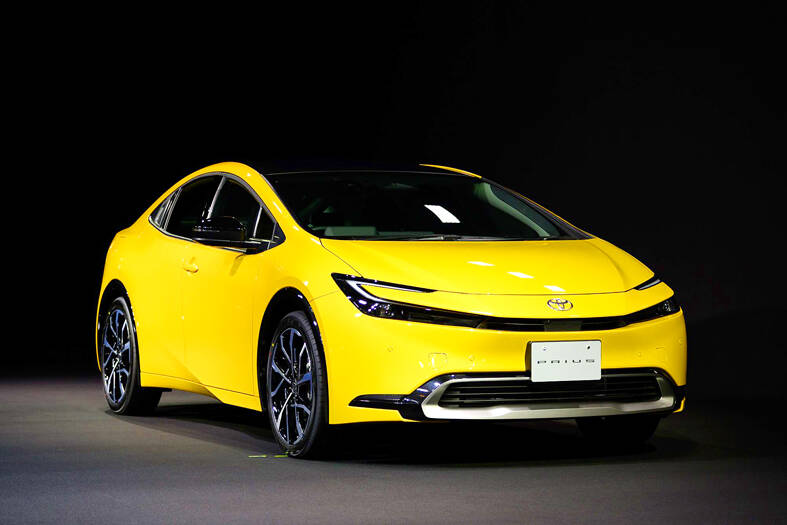Hotai Motor Co (和泰汽車), which distributes Toyota and Lexus vehicles in Taiwan, yesterday announced plans to hike prices across product lines by an average of 2 percent to reflect rising costs in raw materials, components and personnel.
The Taipei-based company said the price adjustments would start next month, after the Japanese vehicle brands indicated they could no longer absorb drastic manufacturing cost hikes.
Raw materials used in making vehicles such as steel, chips and batteries picked up significantly this year, it said, adding that the spikes in personnel, as well as transportation and logistics costs, contributed to inflationary pressure.

Photo: Bloomberg
The company raised prices for Toyota Corolla Altis models by 1.7 percent to 2.1 percent to NT$730,000 (US$23,852) to NT$945,000, the nation’s largest vehicle distributor said in a statement.
People considering buying Corolla Altis Hybrid models would have to pay 1.7 percent to 1.9 percent more, or NT$865,000 to NT$945,000 per car, it said.
Selling prices for Toyota Corolla Cross models would grow to NT$850,000 to NT$920,000, up 1.7 percent to 1.8 percent from current prices, it said.
Corolla Cross Hybrid models would cost 1.5 percent to 1.8 percent more, or NT$895,000 to NT$1.01 million, it said.
Hotai said it sought to minimize adjustments in light of an ongoing economic slowdown. The hikes appear steeper for imported vehicles.
Selling prices for popular imported models such as the Toyota RAV4 would increase in price by 3.1 percent to 3.4 percent to NT$1.01 million to NT$1.25 million, it said.
Toyota GR Supra vehicles would cost an additional 4 percent, or NT$2.69 million, it said.

Stephen Garrett, a 27-year-old graduate student, always thought he would study in China, but first the country’s restrictive COVID-19 policies made it nearly impossible and now he has other concerns. The cost is one deterrent, but Garrett is more worried about restrictions on academic freedom and the personal risk of being stranded in China. He is not alone. Only about 700 American students are studying at Chinese universities, down from a peak of nearly 25,000 a decade ago, while there are nearly 300,000 Chinese students at US schools. Some young Americans are discouraged from investing their time in China by what they see

MAJOR DROP: CEO Tim Cook, who is visiting Hanoi, pledged the firm was committed to Vietnam after its smartphone shipments declined 9.6% annually in the first quarter Apple Inc yesterday said it would increase spending on suppliers in Vietnam, a key production hub, as CEO Tim Cook arrived in the country for a two-day visit. The iPhone maker announced the news in a statement on its Web site, but gave no details of how much it would spend or where the money would go. Cook is expected to meet programmers, content creators and students during his visit, online newspaper VnExpress reported. The visit comes as US President Joe Biden’s administration seeks to ramp up Vietnam’s role in the global tech supply chain to reduce the US’ dependence on China. Images on

New apartments in Taiwan’s major cities are getting smaller, while old apartments are increasingly occupied by older people, many of whom live alone, government data showed. The phenomenon has to do with sharpening unaffordable property prices and an aging population, property brokers said. Apartments with one bedroom that are two years old or older have gained a noticeable presence in the nation’s six special municipalities as well as Hsinchu county and city in the past five years, Evertrust Rehouse Co (永慶房產集團) found, citing data from the government’s real-price transaction platform. In Taipei, apartments with one bedroom accounted for 19 percent of deals last

US CONSCULTANT: The US Department of Commerce’s Ursula Burns is a rarely seen US government consultant to be put forward to sit on the board, nominated as an independent director Taiwan Semiconductor Manufacturing Co (TSMC, 台積電), the world’s largest contract chipmaker, yesterday nominated 10 candidates for its new board of directors, including Ursula Burns from the US Department of Commerce. It is rare that TSMC has nominated a US government consultant to sit on its board. Burns was nominated as one of seven independent directors. She is vice chair of the department’s Advisory Council on Supply Chain Competitiveness. Burns is to stand for election at TSMC’s annual shareholders’ meeting on June 4 along with the rest of the candidates. TSMC chairman Mark Liu (劉德音) was not on the list after in December last